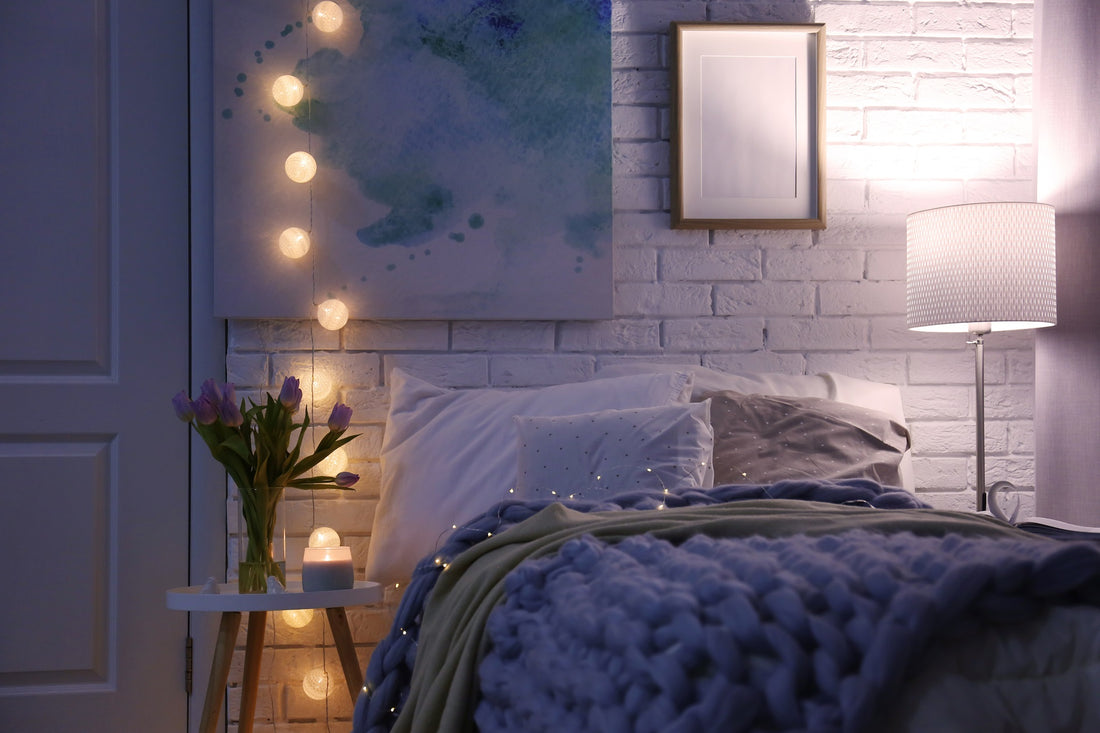How Bedroom Lighting Impacts your Sleep

Most of us love well-lit spaces during the day. Many even plan their days in a way that they can spend an hour or two soaking in the bright early morning sunlight. However, as the day draws to an end, we all seek comfort in spaces where the absence of lights can gently lull us to sleep. Do you recall waking up annoyed when someone hit the lights right when you were about to reach the deepest of your sleep? Or if the sun was beaming in through the windows as you tried to squeeze in a little sleep during the wee hours of the day? Studies show even the faintest light sources in your bedroom can become focal points that catch your eye and keep you from falling asleep. The brain knows it’s time to relax in the nighttime as the light fades from the sky. Few people also recognize that intense light exposure during the day might enhance sleep, since sunshine, particularly in the morning, helps to regulate your circadian clock for the day by alerting your brain to wake up. The greater the contrast between day and night lighting, the better your sleep will be.
The circadian rhythm of a person might become out of sync with the day-night cycle when they are exposed to excessive or improperly timed artificial light. This may disrupt their sleep and have other concerning health effects. There are many factors that impact your sleep cycle. Some of them are excessive light, background noise, the type of mattress you sleep on, or an extra glass of caffeine. Everyone has unique sleep habits. While some people can fall asleep whenever they want and wherever they want, others are particular about their sleeping environment. Some like complete silence, while some enjoy soothing music. Some people prefer a soft bedside lamp in the space, while others prefer the room to pitch dark. But, the question is, what amount of light is too small? How dark or light should a bedroom be for the best sleep? When should you turn off the lights? Read on as we tell you how the light in your bedroom can impact your sleep quality.
Your bedroom lighting can affect your melatonin production: According to the National Centre for Complementary and Integrative Health, the hormone melatonin is produced by the human brain in reaction to darkness. It aids in sleep and the timing of our internal 24-hour clock, or circadian rhythms. It communicates with the brain in a way that relaxes the muscles, makes one feel sleepy, and lowers body temperature. The production of melatonin can be inhibited by exposure to bright lights at night. A lesser level of melatonin can create difficulties falling asleep and sometimes even a complete lack of sleep. Even though our bodies produce the most melatonin as nightfall draws near, exposure to light might cause it to decrease, keeping you up late or preventing you from falling asleep at all.
Here are a few things that you can do in order to avoid losing sleep because of wrong lighting-

Keep gadgets out of your room: It is more difficult to fall asleep and remain asleep when you are exposed to light from energy-saving lamps, laptops, and cell phones. Keep all of your devices out of your bedroom for more peaceful sleep. Reading in bed on your phone or iPad can be a soothing hobby to help you unwind after a hectic day, but if you are having trouble sleeping, it can become troublesome. An association between bed and being awake and doing other things can be formed if you spend time in bed doing activities like reading, watching TV, checking work emails, or playing on your phone. Consider stopping reading in bed if you have insomnia. Before going to bed, read outside of the bedroom until you feel drowsy, and then hit the bed. Additionally, to shut out morning lights or street lights and keep the room dark, invest in a pair of high-quality, well-lined drapes and a blackout blind.

Use dim lights if needed: It is preferable to use a red light or the dark if you need to use the restroom in the middle of the night because a bright light could make it difficult for you to fall back to sleep. The brain may be tricked into believing that morning has already arrived by turning on the light. To avoid disturbing your sleep, try using LED lights with a very low light level.
Choose a low-lit table light: If you enjoy a little nighttime reading, bedside table lights are available in a variety of designs, hues, and materials. A bedside lamp with a shade will offer a soft, warm glow that is ideal for bedtime and will also prevent waking up anyone who isn’t a night owl.
Role of a comfortable mattress: How do you feel post a restless night? The short-term effects of sleep quality are typically noticeable as soon as you wake up, and might range from tiredness to headaches. Many people ignore the benefits of a comfortable mattress that lets you have a good night’s sleep. You can fall asleep and stay asleep with the help of your mattress. Often, all it takes to keep you from obtaining the restful sleep you need is a mattress that is too hard, too soft, not supportive enough, or just plain uncomfortable.
Losing sleep because of an uncomfortable mattress will not only impact your physical health but may also have an adverse effect on your mental health and ability to concentrate. Insufficient sleep regularly can have a negative impact on your cognitive abilities and, over time, produce significant changes in your behavior and personality. Focus on the quality of the mattress you’re currently using and see if it enables you to sleep well each night. If you want to take good care of your mental health, investing in the best mattress for sleeping at night would be the best choice.
Use an eye mask: Using an eye mask is another option for preventing light from disturbing your sleep. Through their shielding properties, eye masks aid in blocking out this artificial light. The intrinsic body clock in your body is resynchronized with the sun’s rising and setting. A relaxing bedtime ritual can condition your brain to understand that everything is safe, tranquil, and pleasant. One such routine may include putting on an eye mask for sleep. The brain receives a signal from your routine that it is time to go to sleep.





